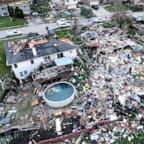Despite hazardous working conditions, many states are rolling back child labor laws
"Finding just one child in harm's way is one too many," a labor official says.
Duvan Perez died last summer during his shift working on a Mississippi farm. His 16-year-old body "became entangled" in a poultry processing machine he was cleaning, according to Mar-Jac Poultry, the company that hired him -- a gruesome death that federal regulators later called "a preventable, dangerous situation" that no worker should have been in, "let alone a child."
At the time of Perez's death the company denied knowing his true age and said it would never knowingly put a minor, or any employee, "in harm's way."
According to the Department of Labor, last year 5,800 children were employed in violation of child labor laws, representing an 88% increase since 2019. And of the 955 child labor cases that were investigated and closed by federal regulators in 2023, more than half involved minors employed in violation of hazardous occupation laws.
Advocates say deaths like Duvan Perez's are an indication that laws protecting children from hazardous work conditions should be strengthened.
"Finding just one child in harm's way is one too many," said Jessica Looman, the Department of Labor's Wage and Hour Division Administrator. "The exploitation of child labor is unacceptable, and it's why the vigorous enforcement of child labor laws continues to be a top priority for the Department."
But instead of strengthening the child labor laws, several states are working to relax them.
According to the left-leaning think tank Economic Policy Institute, at least 30 states have introduced or passed bills to weaken child labor protections since 2021 -- and in nine of those states, legislation has been introduced to expand youth employment in hazardous occupations or workplaces.
In this year alone, 11 states have introduced or taken new action on bills to roll back child labor protections in 2024, according to EPI.
"It is immoral and inappropriate and utterly the wrong decision to roll back child labor law," said Terri Gerstein, the director of a labor initiative at New York University. "All that weakening and rolling back child labor laws is going to do is create more kids whose fingers and hands, legs are amputated who are killed on the job."
Regulators have been fighting back, fining companies that violate child labor laws to the tune of millions of dollars. But advocates says those penalties have done little to staunch these preventable fatalities, and many families like Perez's are turning to lawsuits to hold companies accountable.
'They did nothing'
Late last month, Perez's mother, Edilma Perez, filed a wrongful death lawsuit against Mar-Jac Poultry, two Mar-Jac employees, and Onin Staffing, the agency that hired Perez.
The lawsuit alleges that Perez was killed due to Mar-Jac ignoring safety regulations, and claims that Onin Staffing was negligent in illegally assigning the 16-year-old to work at the plant. The defendants, the lawsuit claims, "acted intentionally, willfully, wantonly, knowingly, with malice and/or were grossly negligent and in reckless disregard to the rights and the safety of the decedent and others similarly situated."

The complaint points to an Occupational Safety and Health Administration (OSHA) safety report released last month that found the poultry processing plant "disregarded safety standards." The lawsuit alleges that safety records by OSHA reveal the company received citations for incidents that led to two other fatalities, three amputations, and a hospitalized injury due to a fall, over the last three years.
OSHA cited Mar-Jac Poultry with 14 serious and three "other than serious" violations and proposed $212,646 in penalties for Perez's death. The agency previously cited the company for an incident in 2021 in which an employee who was not a minor suffered fatal injuries while working.
Court records reviewed by ABC News found that the Hattiesburg plant was also sued twice in recent years by people who alleged they had sustained injuries at the plant. One of the lawsuits, filed in December 2022, will go to a jury trial this August. In the other lawsuit filed by a veterinarian for the Department of Agriculture who fell during an inspection, a jury found in favor of the defendant, Mar-Jac Poultry.
"This case was a tragedy that should have never happened," Jim Reeves, the attorney for Edilma Perez, said of Duvan Perez's death. "Not only had there been [two] other workers killed at this plant in the last three years, one was in a very similar way."
"And they had explicit direct warnings from OSHA to correct the problems and per OSHA's report," said Reeves.
Mar-Jac Poultry, Onin Staffing and the two employees accused in the lawsuit did not respond to a request for comment from ABC News.
In a statement released shortly after Perez died, the poultry processing company blamed Onin Staffing for hiring Perez, saying they had no idea he was a minor.
"Mar-Jac MS would never knowingly put any employee, and certainly not a minor, in harm's way but it appears, at this point in the investigation, that this individual's age and identity were misrepresented on the paperwork," the company said.
'Plausible deniability'
According to the lawsuit, Onin Staffing failed to properly screen workers, including Perez, to ensure they were of the appropriate age, and failed to "take adequate precautions to ensure that Perez was assigned a safe place to work."
Perez used the identity of a 32-year-old man to obtain the job at the poultry plant.
"This man was obviously 16 working under an ID that said he was almost twice that age," Reeves told ABC News. "Anyone who was interested in determining his age could see he was not 32 years old."
"I saw [his] picture," said Gerstein. "You don't have to be some kind of forensic analysis person to understand that that was a child."
Gerstein told ABC News she believes companies can "deflect responsibility" when incidents occur involving businesses they subcontract.
"It gives them plausible deniability, saying, 'We had no idea this was going on and we're going to cut our contract with that contractor,' and to point the finger and deflect responsibility," said Gerstein.
"But they can really monitor much more extensively the operations of their contractors and staffing agencies and everyone in their supply chain," Gerstein said. "They can do more due diligence before they contract."
Holding businesses accountable
In late January, Washington state's Department of Labor fined a construction company the maximum penalty after a 16-year-old had both legs amputated from injuries sustained while working. In December, a sawmill in Wisconsin was fined $1.4 million after a 16-year-old died last summer while trying to unjam a stick stacker machine. And just last week, a roofing company in Alabama paid penalties after a 15-year-old fell and died at a work site.
With the increase in child labor violations, the Department of Labor issued a bulletin to offices across the country in November, announcing the agency should no longer determine child labor civil penalty assessments on a per-child basis, but instead on a per-violation basis.
Reid Maki, the Child Labor Advocacy Director for the National Consumers League and Child Labor Coalition, said that lawsuits also help hold businesses accountable.
"It's really hard for families to be compensated for these tragedies without going to court," Maki told ABC News. "Sometimes it's really the only option to get good compensation and to create a disincentive for companies to hire illegally."
The prospect of lawsuits like the one filed by Perez's mother, Gerstein said, should "be something that should make businesses add additional protections to make sure they don't commit violations."
Reeves told ABC News that while cases like this typically settle, Perez's case "might be the exception."
"We're going to demand enough to make this company think twice before they do it again," Reeves said. "This case may be the exception because the conduct is really so egregious."




